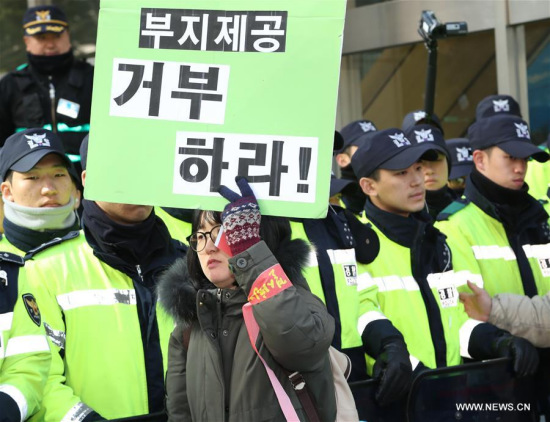
A woman protests against the deployment of an advanced U.S. missile defense system in front of the Lotte Headquarters in Seoul, South Korea, Feb. 27, 2017. (Xinhua/Lee Sang-ho)
South Korea's Lotte Group approved the land swap with the government here on Monday to enable the deployment of the controversial U.S. missile defence system known as THAAD, virtually opening a Pandora's box in Northeast Asia.
The swap, which gives the South Korean defense ministry the Lotte Skyhill Country Club in Seongju County, North Gyeongsang Province, for the deployment of the U.S. Terminal High Altitude Area Defence (THAAD) system, paves way for a speedy installation of the system by late June at the earliest.
THAAD's planned deployment is in the name of protecting South Korea's security from the neighboring Democratic People's Republic of Korea (DPRK). Yet ironically, THAAD might not be able to intercept DPRK missiles targeting South Korea's territory, as THAAD is designed to shoot down missiles at a relatively high altitude of 40 to 150 km, but the DPRK's rockets fly at a lower altitude of about 20 km.
What's worse, South Korea's drinking poison to quench a thirst might further irritate the DPRK and make it speed up nuke development by building more nuclear bombs and testing more missiles. THAAD's arrival would only escalate the military confrontation between the two sides and bring more danger to regional security.
South Korea's THAAD deployment decision has also met strong opposition from China and Russia as THAAD's powerful X-band radar can detect as far as 2,000 km, well into Chinese and Russian territories, allowing the U.S. to monitor flights and missile launches of the two countries conveniently.
China has expressed strong dissatisfaction with the THAAD deployment as it damages China's security interests and breaks a strategic balance in the region, while Russia has indicated a military response by deploying a missile unit in the Far Eastern region. Beijing and Moscow have agreed to take "further countermeasures" once the system is installed.
South Korea has also set a bad example for Japan on the THAAD issue, which also claims that its national security is threatened by the DPRK's missile and nuclear developments. If Japan also chooses to become a U.S. "military colony" and deploy THAAD, the situation in Northeast Asia would become even more complicated.
It's obvious that the THAAD deployment is a key step for the United States to build an Asian version NATO, and an important move for the U.S. to build an anti-missile system in the western pacific region.
In general, the THAAD deployment would cause more problems than it solves -- Not only has it little use of shielding Seoul from a possible Pyongyang missile attack, but it will also definitely increase tension in Northeast Asia, leaving very little interest to South Korea itself -- which is quite contrary to the Blue House's initial intention.
The THAAD deployment, which is obviously a bad deal for South Korea and the region though superficially a good one for the U.S., virtually means the opening of a Pandora's box in Noretheast Asia and beyond that the very perpetrators can hardly bring under control.


















































